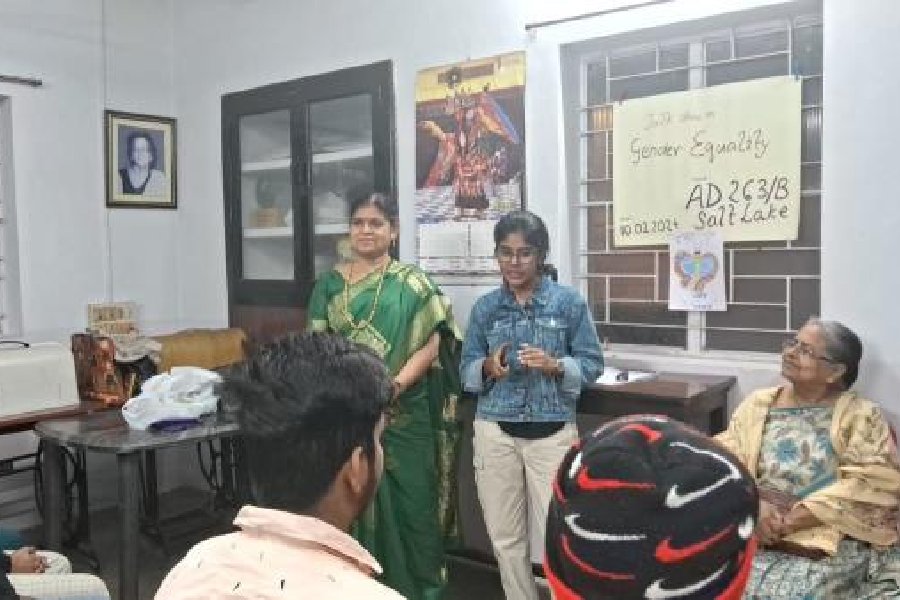A car has an accident and the police find a father and son stuck inside. The father dies on the spot and the son, though badly hurt, is still alive.
The child is rushed to the hospital, but when the doctor sees his face, freezes and says: “I can’t operate on this boy. He’s my son!” How is this possible?
Nobody in the AD Block audience could crack this riddle that was asked at a game show on gender equality recently. And all slapped their heads when told the simple answer: The doctor was the child’s — not father but — mother.
“This riddle goes to show how deep-seated gender stereotypes are. If it’s a nurse we assume it’s a woman; if it’s a doctor it must be a man,” said the host of the show.
The contest was organised on behalf of Hyderabad-based NGO Rubaroo and was held at a partner NGO’s premises next to AD Park. The audience comprised students present and past who come to the centre to learn vocations like stitching and computers.
Women superheroes
“In a world of Superman, Batman and Iron Man, name a woman superhero,” asked the host. The audience scratched its head till finally, Ankan Majumdar saved face with Black Widow and Wonder Woman. But no one could come up with a convincing answer on why there were so few of them.
There were also clues leading to pioneers in women’s education. “She was born in 1880 in what is today Bangladesh,” said the host. “She started the first school for Muslim women.” The youths finally guessed the answer when she said: “There is a school in Salt Lake named after her. “Begum Rokeya!” shouted some girls familiar with the CJ Block school.
The game of dumb charades left the audience in splits. The youths picked chits that had the names of strong women written inside and tried to enact them out to their teammates.
Pramod Kumar Sah pounded his right fist in the air repeatedly and his clueless teammates guessed things like priest ringing the bell at a temple. The answer was Mamata Banerjee delivering an animated speech.
Mousumi Baidya made a valiant attempt showing “drinking with her thumb”, and “boss-like attitude with arms folded and nose in the air”. The answer was former PepsiCo chief Indra Nooyi. Jhansi ki Rani, Mother Teresa etc were enacted and the audience tried to discuss what made these women empowered.
Men don’t do chores
The role-play section had a girl don a fake beard and play the husband, while a boy draped a dupatta as a sari to play the wife. They had to enact some scenes, such as when both husband and wife returned home from work exhausted and tried to divide the chores. After they fought it out, it was later discussed how husbands often feel chores are not a man’s job.
A 17-year-old from the audience said she sees such role-play-like fights at home every day. Tiasha Barui fought tooth and nail in the act as the “husband” but in real life, said her home scenario was different. “In my house, my father shares the load of completing chores. But I know this is a rare case as my friends tell me I’m lucky to have such an understanding father. Men don’t usually empathise with women,” said the girl who works as a tele-caller.
The most heart-breaking observation was on how the husband (girl wearing fake beard) ended up dominating his wife (boy wearing sari). “Did you see how he became meek upon wearing the sari,” was the murmur in the crowd.
Won’t work with woman
There was a chit-chat section with Subhechchha Bhuniya, who is one of the few women artiests who work on theme pandals during Durga puja. She had, in fact, worked on the pandal in AD Block right outside the venue last year.
“Some established male theme makers specify they won’t work with women as they think we cannot climb ladders or work as hard as men. Such sexist beliefs are ridiculous, especially at a puja that worships a goddess,” she said.
“My work has me returning home in the dead of the night and I often have to hear filthy, judgmental comments from neighbours,” said Subhechchha. “It’s good that there are more men at this session than women, for it is they who need to accept gender equality. Please support your mothers and sisters when they want to do something for themselves,” she said.
Bubu Basu, secretary of the centre noted how textbooks still impose that the father goes to office and mother goes to the kitchen. Why are stereotypes drilled into children’s heads from childhood? Why do we use proverbs like “churiya pehen rakhi hai kya?” They reek of discrimination,” she said.
“The objective of the show was to make the youths recognise gender stereotypes and to introduce them to women who have broken the glass ceiling who they can emulate,” said the host on behalf of Rubaroo, an NGO that works on issues like gender equality and interfaith harmony.
